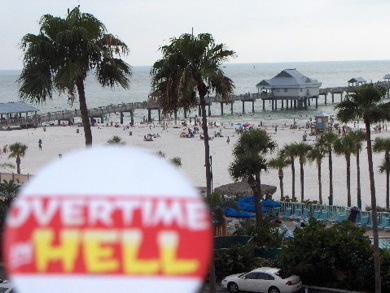READER COMMENTS CLOSED FOR THE WEEKEND
Friday, Jul 13, 2007 - Posted by Rich Miller
The House and the Senate are coming in tomorrow morning at 9, but it’ll most likely be just a “gavel and go” thing.
The governor, reportedly at Senate President Emil Jones’ request, has backed off his insistence that legislators stay in special session seven days a week. Both chambers will reconvene on Monday after adjourning tomorrow. Jones’ members must be getting restless.
You can check back here later tonight for the audio clips of today’s post-game press bangs, and I’ll keep half an eye on things tomorrow morning, but unless something crazy happens, there will be no blogging and no Capitol Fax until Monday.
Hooray!
Go to Illinoize if you’re not completely burned out…
* Audio clips from the post-game show…
* Sen Prez Emil Jones
* House Speaker Madigan
* Senate GOP Leader Watson
* House Repub Leader Cross
* Rep Jay Hoffman (for the guv)
* OK, one more thing. I totally forgot about this cartoon, which was sent in by a talented reader. The image is also now available on various t-shirts at our charity store. You can click on the image for a larger view. As you know, all profits are going to the Sojourn shelter.

Comments Off  
|
Adventures of the “Overtime In Hell” button
Friday, Jul 13, 2007 - Posted by Rich Miller
[Submitted by “a friend”]
“Forget Special Session, I’m outta here.”

“Wait, is that Rod’s plane over there?”

“He has ‘killer’ instincts, looks good and puts on a great show… Hmmmmm.”

“Can the Governor convene special session wherever he wants?”
“At least I had the CapFax blog to keep me up to date while I was gone.”
Get your OT in Hell button today!
Comments Off  
|
|
Enter your password to view comments  
|
Question of the day
Friday, Jul 13, 2007 - Posted by Rich Miller
How do you think Sen. Barack Obama’s presidential campaign is progressing so far? Back up your assertions with examples if you can and try to avoid quick little “drive-by” comments. Thanks.
50 Comments  
|
Back and forth on health insurance plan
Friday, Jul 13, 2007 - Posted by Rich Miller
* The guv has a new idea for health insurance…
As his proposal for near-universal health insurance languished in Springfield, Gov. Rod Blagojevich on Thursday announced an administrative maneuver designed to control the cost of individual medical premiums.
Using the state insurance code, regulators under Blagojevich will draft a rule that prevents insurers from hiking a customer’s premiums based on the person’s “health status” or medical condition. A second rule change — filed Thursday on an immediate, emergency basis — would require insurance companies to file quarterly financial disclosures about individual policies. A similar requirement will be created for small-group insurers, a spokeswoman said.
Blagojevich outlined the plans during a news conference at a Chicago hospital campus, where he was joined by health-care consumers who say they’ve been hit with skyrocketing insurance premiums. Lombard resident Roy Bocchieri said that after he was diagnosed with a blood disease, his premiums jumped when it came time to renew his individual policy.
* There seems to be some disagreement among critics over how the proposed rule changes would impact insurance polices…
House Insurance Committee Chairman Frank Mautino, a Spring Valley Democrat, said only eight other states have similar programs. Some have seen insurance premiums increase and companies stop writing policies, he said.
“It has the tendency to reduce the amount of coverage available within the market and also to raise the price because the pool within that structure tends to be a sicker pool,” Mautino said.
* But the Illinois Policy Institute claims this…
[I]nsurance companies currently only consider demographics, health care inflation, and the overall financial results of their risk pools when setting their renewal rates, and do NOT rate anyone’s individual policy renewal based on an individually insured’s claims. An Illinoisan with no claims on an individual health insurance policy receives the same increase at renewal that another Illinoisan who has a $1,000,000 claim on an individual policy with the same insurance company.
* The Sun-Times report partially backs up the IPI…
One major health insurance company, Humana, indicated that the rule the governor announced would not affect it because it “does not currently use an individual’s health status or health information when determining premium rate adjustments.”
* As does the Crain’s piece…
…a spokesman for UnitedHealthcare of Illinois Inc. [said] only that the firm does not set premium rates for individuals based on their health status or claims history.
* But back to the Sun-Times…
Not all insurers share that philosophy, however. Small-business owner Roy Bocchieri, 44, of Lombard, was paying about $700 a month for family coverage in 1999, he said. Then he got diagnosed with a rare bone-marrow disease that continues to require regular treatment.
Bocchieri’s monthly premiums increased 40 percent the first year after the diagnosis. They continued to increase every year thereafter.
“When they hit the $2,000-a-month range, I said ‘enough is enough,’” said Bocchieri, a father of four.
* But Speaker Madigan’s spokesperson dismissed the entire thing as a diversion…
Madigan spokesman Steve Brown said the governor’s travel schedule this week was curious, given the need for policymakers to be in Springfield.
“When the ADD (attention deficit disorder) kicks in, he flits off to Chicago every couple of days,” Brown said. “Absolutely, it’s diversionary.”
42 Comments  
|
Casinos discussed at Statehouse
Friday, Jul 13, 2007 - Posted by Rich Miller
* Gaming expansion is back on the table…
Senate Democrats offered Thursday to retool a major gambling package — that nose-dived in the House — by letting communities throughout the state vie for up to four new casinos.
The plan that narrowly passed the Senate in late May but died in the House specified casinos for Chicago, the south suburbs, Waukegan and a location near O’Hare Airport. But some towns outside those geographic boundaries, such as Country Club Hills and Rockford, complained about being excluded.
“We’re opening it up to every city in the state of Illinois, and I think that’s a good thing,” said Sen. Rickey Hendon (D-Chicago). “You get more people [in the Legislature] maybe to vote for it if they got a chance to participate.”
A multibillion-dollar gambling expansion could help build new schools and roads and provide a major infusion of dollars into the state’s under-funded public education system, its supporters said.
* But Bethany Carson has a good piece that points out the many pitfalls ahead…
But the gaming meeting didn’t advance any new legislation, and there’s a long way to go. For years, a slew of hang-ups have stymied efforts to expand gaming for state revenue. The horseracing industry wants subsidies from the state so it can compete with expansion of other gaming. But there’s debate about the subsidy level and the mechanism — slots at racetracks or an “impact fee” charged on casinos. And there’s a trust issue about whether the state will simply change the law after the first wave of cash flows in, said Rep. Bob Molaro, a Chicago Democrat in the meeting. Other sticking points include the number of new boats and their locations. Lang said in early June that his version of gaming legislation spelled out nine Chicago-area communities in need of economic development that would qualify for one of the new gaming licenses.
Two other complications were raised after the meeting. One was by House Minority Leader Tom Cross of Oswego: “I think for everyone, one of the central questions here is, when would this money become available, assuming you bought into any of these concepts? We’re into July, and to get any of these things up and running, if you bought into that, you’d have to be pretty aggressive [for it] to be in the ’08 fiscal year.”
The other was mentioned by Sen. James DeLeo, another Chicago Democrat in the meeting. The priority of using gaming revenue for road and school construction projects might be more complicated. “We were warned by the budget director that casino revenues, gaming revenues are very hard to sell bonds on,” DeLeo said. “There’s a lot of if, if, ifs in gaming.” […]
- The governor and Jones have said they support four new casinos in the Chicago area, and Jones has said he wants the money to go to education.
- Cross and House Speaker Michael Madigan said their caucuses still support expansion of gaming only at existing casinos, with the money going toward road and school construction projects.
- And Watson said Thursday the Senate GOP Caucus is open and flexible but would prefer the revenue fund a capital program.
* More…
One irony is the gambling negotiations were held in the governor’s Capitol office-without the governor, who was holding a press conference in Chicago.
Senate Minority Leader Frank Watson (R-Greenville) said the advantage of working without Blagojevich is that a meeting can be held absent the governor’s nearly automated efforts to stay on his talking points: “Press 4 for this speech, and press 12 for this one.”
In Chicago, Blagojevich said he would “hold my nose” and support gambling revenues as a way to pay for an infusion of funds into education and his proposal for state-supported health care.
Thoughts?
12 Comments  
|
Robin Hood and the Sheriff of Nottingham
Friday, Jul 13, 2007 - Posted by Rich Miller
* My Sun-Times column this week is ultimately about the governor’s involvement in the House’s gun control debate, but this is how it begins…
Gov. Rod Blagojevich playfully told me in April that he had come up with a theme for his epic battle with Illinois House Speaker Michael Madigan. At the time, Madigan was blocking the governor’s (now dead) gross receipts tax on business and didn’t seem thrilled with Blagojevich’s desire to spend billions on a universal health insurance plan.
The governor said he had cast himself in the role of Robin Hood. Madigan, of course, was the villainous Sheriff of Nottingham.
“Wonderful,” I thought. “This legislative session will never end.”
And here we are, more than three months later, stuck in a nasty overtime session that has Blagojevich repeatedly slamming Madigan as a “right-wing Republican” and threatening to take him to court over the speaker’s refusal to obey the starting times in the governor’s special session proclamations. Two legislators have publicly called for the governor’s impeachment, a Downstate newspaper has claimed that Blagojevich is “going bonkers,” and one of Blagojevich’s fellow Chicago Democrats told reporters that the governor is a “madman” and “insane.”
And that’s just in the past week.
* Via IlliniPundit, Democratic state Sen. Michael Frerichs had some keen insights into what’s going on in his caucus…
“The Governor put out this big legislative proposal that has next to no legislative support, but he continues to hold on and say, ‘Hey, we can all go home as soon as you vote for my budget,’” Frerichs said. “It’s clear that that’s his tactic: to keep us away from our families and our other jobs, for those who have other jobs, until we’re sick and tired and we’re willing to cave in.” […]
If anyone breaks the budget logjam, Frerichs said, it will have to be Senate President Emil Jones, D-Chicago.
“I think it’s up to the Senate president to say, ‘I’ve hung with you, but it hasn’t gotten us anywhere. My members have these priorities - education funding, proper funding of pensions, property tax relief - and if you’re not willing to get those, then I’ll go work with the speaker and we’ll override your veto.’
“If that happens, then the governor really becomes irrelevant. If you can get those four legislative leaders to get together, it will make the next three years very interesting.”
He said the Senate Democrats have urged Jones to break with Blagojevich, “but the whole caucus has not spoken with any unanimity yet.”
* But Andy Shaw made a good point in a story he filed yesterday…
The irony here is that Blagojevich’s ambitious plans, and his style, go over well with regular people, but not the politicians in Springfield that he needs to get along with the pass a budget. The governor says he is willing to compromise and wait a year to implement his programs if that makes it easier on lawmakers. But a spokesman for Speaker Madigan says that doesn’t make any sense either because the same people still have to cast the same votes.
* The Bloomington Pantagraph published yet another negative editorial on Blagojevich…
He told the Associated Press that the current situation is “totally what I envisioned was going to happen in January, February and March” and things may get more publicly testy “as the days and weeks unfold.”
Weeks? May we remind the governor that the current 30-day budget extension only has about a couple of weeks left?
Oh yeah, we forgot, the governor who “envisioned” as long ago as January that the current situation would exist said he hasn’t “thought that far ahead” when asked if he would go along with another 30-day extension.
Illinois needs and deserves better leadership than it is getting. Lawmakers of both parties must fill the void left by the governor.
* And the AP looks at the pros and cons of the massive legislative meetings that were held at the governor’s mansion the past several days…
Sen. Terry Link, a top lieutenant to Senate President Emil Jones, said House members seem to be learning basic information that senators have already gotten from their leaders.
“It seems over there that these House members have been asking questions that basically I think could be read in newspapers almost,” said Link, D-Vernon Hills. “For a learning curve for them, it’s good.”
Madigan, who along with Republicans have opposed Blagojevich’s spending plans, said Monday he considered the legislator meetings “very productive.”
“They can see that these positions being advanced by the administration are not consistent with reality,” Madigan said.
Blagojevich counters that it gives House Democrats a chance to see the “right-wing Republican” views being advocated by Madigan, who opposes the governor’s call for a major new health care program.
29 Comments  
|
Friday, Jul 13, 2007 - Posted by Rich Miller
WLS radio is having some political fun this week. A few days ago, House Speaker Michael Madigan appeared on the Don & Roma show. You can download that show here.
And this morning from 9-11, former gubernatorial candidate and state treasurer Judy Baar Topinka will be interviewed by the legendary John “Records” Landecker. Go here to listen.
I’ll be back in a few with more session news. Running late today.
4 Comments  
|
|
Comments Off  
|
Morning shorts
Friday, Jul 13, 2007 - Posted by Paul Richardson
* Alton man charged with threatening state senator
* Joe Birkett will seek a 4th term
* Animal Farm: Footlik flip flop?
* Decatur likely site of 2008 GOP state convention
* State rips East Peoria nursing home
* Illinois bills aiding coal industry await action
But Gonet said a key legal provision in stalled legislation — one that would basically entitle the FutureGen developers to legal protection from the state — must pass for Illinois to compete with Texas.
Emphasizing the interest in the plant, on Thursday, state Rep. Kurt Granberg, D-Carlyle, announced a $2.5 million grant from the Illinois Clean Coal Review Board to entice the public-private partnership to choose a site in Illinois for FutureGen.
* Phil Kadner: U.S. Rep. Lipinski sleeps in his Washington D.C. office
* Aide, businessman added to Troutman indictment; more here
* Sun-Times Editorial: Overpaid guards show how seriously Cook Co. takes tax dollars
The latest example is the $35,000, 12-day contract awarded to a clout-heavy security firm to make sure workers don’t use 10 fire escape windows at the County Building, which are locked and taped off because of renovations.
* Transportation chief steps down in Chicago
* Chicago firefighters union kicks out its leader
* Chicago city hall to end flat water rates
* White firefighters sue over promotions in Dolton
* Shouting but no ’sorry’ for state closing Rockford MILL
* Friday Beer Blogging: Milwaukee protest edition
16 Comments  
|
|
 Support CapitolFax.com
Support CapitolFax.com
Visit our advertisers...
  ...............
...............
 ...............
...............
 ...............
...............
 ...............
...............


|
   
|
Hosted by MCS |
SUBSCRIBE to Capitol Fax |
Advertise Here |
Mobile Version |
Contact Rich Miller
|

















